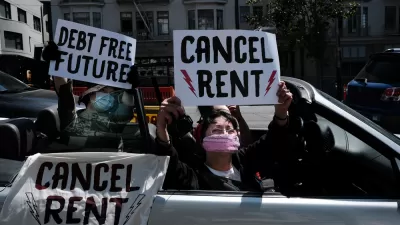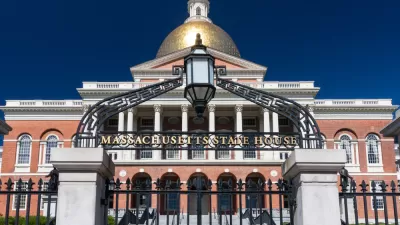A bill announced by Rep. Ilhan Omar would release tenants and homeowners from housing payments until the national emergency is lifted, and would make up the losses to landlords and lenders through a federal fund.

Rep. Ilhan Omar (D-Minn.) has introduced a bill that would cancel rents and individual mortgage payments nationwide until one month after the national emergency declaration is lifted.
“The federal government must act now to prevent a complete collapse of the housing market,” said Rep. Omar in a Facebook Live press conference [last week] announcing the bill. “In 2008 we had the ability to bail out Wall Street. This time we need to bail out the American people who are suffering.”
HR 6515, The Rent and Mortgage Cancellation Act, would apply to all tenants who have a lease, and all homeowners who have a mortgage on their primary residence. (It would only cancel mortgage payments for that primary residence.) The bill stipulates that payments would not have to be made up, though it leaves open the possibility that people over a certain income threshold might owe taxes on the relief they receive. Omar’s legislative director Kelly Misselwitz said on a call with tenant organizers last night that this decision was made because the first priority is getting relief out as simply as possible.
Under the bill, which if passed would be retroactive to April 1, tenants would not have to apply for rent cancellation. (Any rent paid for April or May before the bill passed would be reimbursed to tenants.) Instead, the bill would establish funds, which would be managed by HUD, to which property owners and lenders could apply for relief based on their lost income. That relief would make up the entire amount of lost payments, but would come with stipulations—for example, property owners accepting the relief must not increase rent for five years, follow just-cause eviction guidelines, and not discriminate against tenants based on their source of income, immigration status, conviction or arrest record, sexuality or gender, or credit score. The bill would prioritize payments to nonprofit owners and small landlords first, and require financial disclosures in order to determine this prioritization.
Linda Mandolini of Eden Housing, speaking last week about the concept of rent relief in general, not Rep. Omar’s bill, suggested that directing relief through landlords would be more efficient and easier on tenants. “It would be much faster than going one tenant at a time,” she noted....
FULL STORY: Ilhan Omar Proposes Bill to Cancel Rent, Mortgage Payments During Pandemic

Planetizen Federal Action Tracker
A weekly monitor of how Trump’s orders and actions are impacting planners and planning in America.

Maui's Vacation Rental Debate Turns Ugly
Verbal attacks, misinformation campaigns and fistfights plague a high-stakes debate to convert thousands of vacation rentals into long-term housing.

San Francisco Suspends Traffic Calming Amidst Record Deaths
Citing “a challenging fiscal landscape,” the city will cease the program on the heels of 42 traffic deaths, including 24 pedestrians.

Amtrak Rolls Out New Orleans to Alabama “Mardi Gras” Train
The new service will operate morning and evening departures between Mobile and New Orleans.

The Subversive Car-Free Guide to Trump's Great American Road Trip
Car-free ways to access Chicagoland’s best tourist attractions.

San Antonio and Austin are Fusing Into one Massive Megaregion
The region spanning the two central Texas cities is growing fast, posing challenges for local infrastructure and water supplies.
Urban Design for Planners 1: Software Tools
This six-course series explores essential urban design concepts using open source software and equips planners with the tools they need to participate fully in the urban design process.
Planning for Universal Design
Learn the tools for implementing Universal Design in planning regulations.
Heyer Gruel & Associates PA
JM Goldson LLC
Custer County Colorado
City of Camden Redevelopment Agency
City of Astoria
Transportation Research & Education Center (TREC) at Portland State University
Jefferson Parish Government
Camden Redevelopment Agency
City of Claremont





























